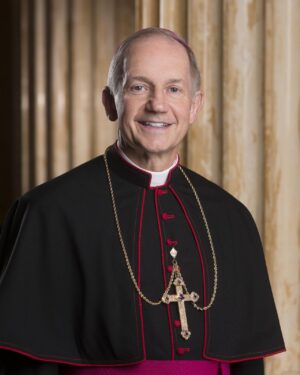
WINDSOR TERRACE — A bishop from Illinois wants to begin a national conversation over whether it’s moral to shut down vast swaths of the economy and society, including churches, during global health emergencies like the COVID-19 pandemic.
Bishop Thomas John Paprocki, of the Diocese of Springfield, Illinois, appeared Tuesday, Oct. 6, on Currents News to discuss opinions that he also wrote last month for Ethics & Medics journal.
The bishop suggested that some government-ordered actions, like shutting down nonessential businesses, can stunt the economy and cause more human suffering.
He opined that the more significant concern is shutting down churches, which impedes the nurturing of spirituality among people who seek communion with God.
“I’m not just saying we should throw all caution to the wind,” Bishop Paprocki told Christine Persichette, the anchor for Currents News. “Yes, we have to take ordinary precautions, but I think shutdowns, as we’ve seen it, are extraordinary.
“And, before we consider doing that again, we should be very careful about whether that’s really required.”
Bishop Paprocki discussed differences between “ordinary” and “extraordinary” measures.
In his article, Bishop Paprocki defined ordinary as “means that do not involve any grave burden for oneself or another.” Examples are the anti-coronavirus measures like social distancing, hand washing, and cleaning surfaces, the bishop said.
Face masks and keeping six feet apart might be inconvenient, but it’s hard to see, as Bishop Paprocki said, any “grave burden for oneself or another.”
Conversely, extraordinary measures, like a president or governor ordering the shutting down of businesses, can cripple an economy. That, in turn, could create heavy burdens for families and individuals who lost their incomes.
In his article, Bishop Paprocki used “end-of-life” scenarios to illustrate the morality of extraordinary measures.
“It is not a sin to decline treatment, for example, because it is too expensive and one does not have the financial resources,” he said.
Also, he added, it is not a sin to decline artificial life-support machines for a terminally-ill person when such treatment would only prolong that person’s suffering. As an example, he described the death of Pope John Paul II.
“He was not rushed to the hospital to be kept on life support indefinitely,” the bishop wrote. “Rather the Holy Father, who was staunchly pro-life, was allowed to die peacefully and gave us a powerful example of how to die naturally.”
In the Currents report, Bishop Paprocki said that he was not criticizing “the good intentions of our governors or other government officials.”
“They’re concerned about protecting the public safety and making sure people are safe and not exposed to a deadly illness,” he added. “So I think they’re saying, ‘I have to do something to save lives and preserve life.’ But I would say we ask that question in many different avenues.”
In the article, the bishop said the National Highway Traffic Safety Administration reported that more than “35,000 people have died nationwide in auto accidents every year since 1951.”
But, he told Currents, “If we want to prevent anyone from dying in an auto accident, we should shut down our highways. We should never get in our cars. We don’t do that. That would be extraordinary. We have to get to work, to school, life has to go on.
“So what do we do? We take ordinary means: we use seatbelts, we use airbags, and we follow the rules of the road.”
Meanwhile, devout parishioners denied access to the Mass and the Eucharist through shutdowns are denied spiritual nourishment and growth.
“Physical health is important,” Bishop Paprocki concluded in the article, “but the highest good is eternal life. The free exercise of religion and access to the means of salvation established by Christ through the church must prioritize the moral and legal order.
“As we reflect on our moral obligations in light of the coronavirus pandemic, we do well to remember these basic teachings of Catholic moral theology as well as the words of Jesus himself.”
He referred to Matthew 10:28-33, in which Jesus said: “Do not be afraid of those who kill the body but cannot kill the soul; rather, be afraid of the one who can destroy both soul and body in Gehenna.”
And in this context, he explained, “We know that Gehenna is the term used in the Bible to refer to an abyss of darkness, chains, and burning flames in a valley of unquenchable fire — in other words, what we call hell.”
Andrew Hansen, a spokesman for the Springfield Diocese, said the bishop has appeared in print and on the airwaves throughout the U.S. to talk about his opinions in the article. Ethics & Medics publishes commentary for The National Catholic Bioethics Center.
Hansen said the diocese hadn’t noticed any significant disagreements to the article, but the bishop is ready to discuss any that may arise.
“Basically, he wanted to start a conversation,” Hansen said, “So, people can start chewing on this.”
